Fatty liver can be reversed if you follow a proper diet and exercise. There are also many food items that can help cleanse the liver and reverse the condition faster.
One of these super-foods for fatty liver is beetroot. So yes, it seems that we’re starting this article with the answer to the question in the title, “Is beetroot good for fatty liver?”
Beets are good for liver health and may be helpful in reversing fatty liver disease. A compound found in beetroot was found to help break down fatty acids in the liver and therefore improve recovery. It is also packed with healthy minerals, vitamins and antioxidants
Beetroot is a type of food that is extremely healthy overall, but various researches have shown that it has increased health benefits of the liver specifically. Which is great news for those diagnosed with a nonalcoholic fatty liver disease.
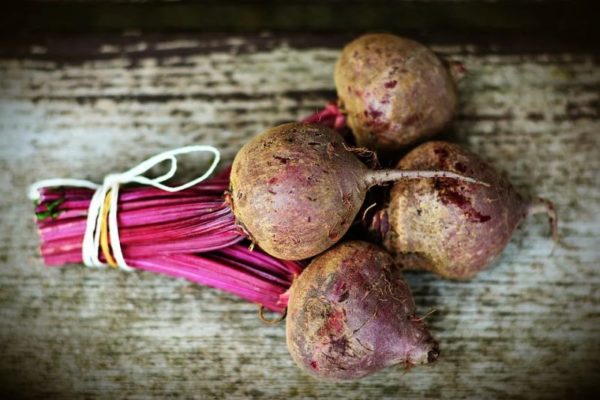
Beets are often recommended in all sorts of liver related problems and results from those who add more beetroot to their diet are impressive and encouraging.
We will see below how exactly is this vegetable going to help your liver get better.
But before we get there, I have to mention that there are some people who suggest switching to an all-beetroot diet or going through longer periods of time of eating nothing but beetroot – and I personally am against this type of approach.
As good as beets are for your liver, balance is key when it comes to healing it – something like a Mediterranean diet works best for reversing NAFLD.
That is because our liver still needs nutrients and minerals from other foods that we eat and which are not present in the beetroot itself.
On the other hand, starting to eat more beetroot if you are not doing so already or increasing the amount you’re consuming is extremely helpful when it comes to reversing a fatty liver or generally keeping your liver healthy.
Your overall health will benefit a lot from increased consumption and fortunately there are various ways to add more to your daily menu and this vegetable itself is tasty and versatile (and also cheap).
I will have some recommendations for this in the article, but until we get there, let’s find out the data on this superfood for our livers!
Why is beetroot so good for the liver?
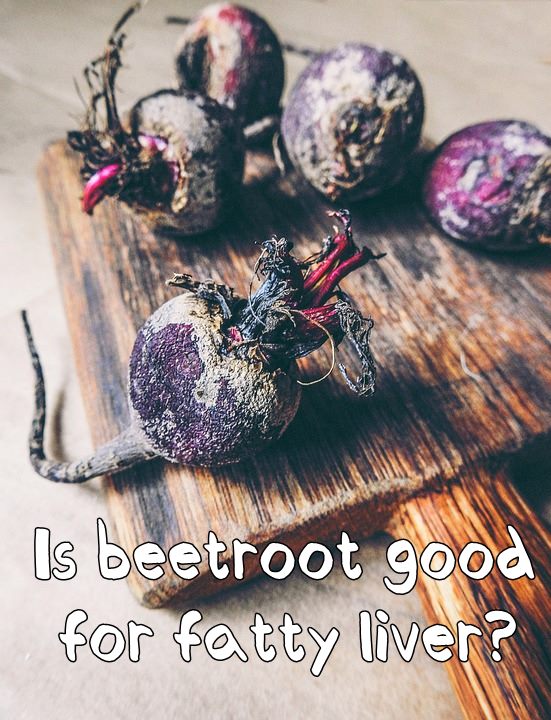
Beets are packed with minerals, vitamins and antioxidants. There are high quantities of iron, calcium, Vitamin C and B vitamins, alongside Potassium and a high amount of dietary fibers.
One of the fibers it contains is called pectin, which is considered to stimulate the cleansing and the removal of toxins from the liver.
It also has Betaine which is a compound that was proven to help improve the nonalcoholic fatty liver disease (study here), as well as the overall health of those consuming it.
Therefore, by eating more beetroot and making it part of your daily diet (or at least eating it a few times a week) you will feed your body with goodies that it needs so badly.
This massive mix of minerals, vitamins and antioxidants are said to be perfect for the liver, helping it improve its functions and heal faster.
Beetroot by itself is not the “cure” for fatty liver, but it definitely is one of those foods that can help. The worst thing it can do is have no effect at all – but there are plenty of studies saying otherwise – like the one I mentioned before or this one.
I personally ate plenty of beetroot – based on the claims that it is helpful – after being diagnosed with a fatty liver and I managed to reverse it (I repeat, as a result of a complete dietary change and exercising, not the beets alone but maybe without it it would’ve taken longer, who knows?)
How much beetroot is good for a fatty liver?
Although many people consider beets a superfood, we unfortunately eat very small amounts of it.
Ideally, you should eat one or two medium-sized beets per day (200 grams / 8 ounces) either as a salad, part of other foods, smoothie or juice. Your liver will love it – but if you find it difficult to have it that often, try to aim for at least a few times per week.
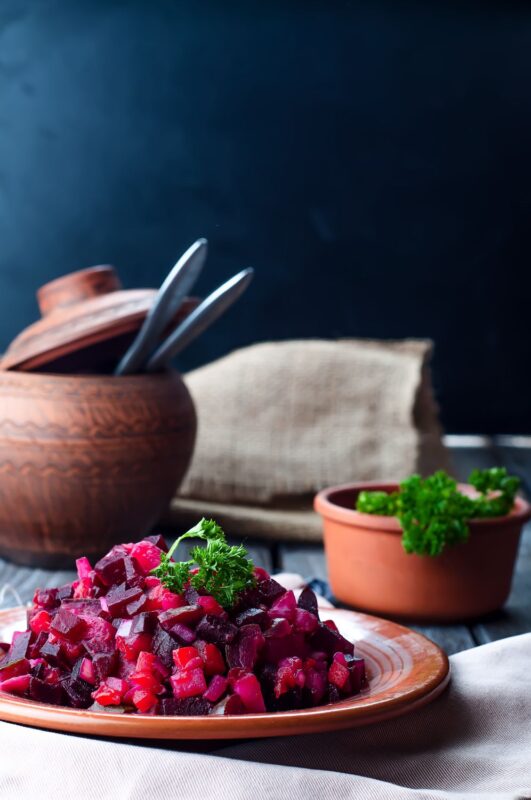
Before being diagnosed with a fatty liver, I ate absolutely no beetroot or maybe just once a year. It wasn’t a top choice although it should’ve been. Now I know.
Either way, I probably am not the only one whose intake of this great vegetable was limited, so I am going to share some recommendations on how to easily incorporate it into your diet and get enough of it.
Beetroot Juices
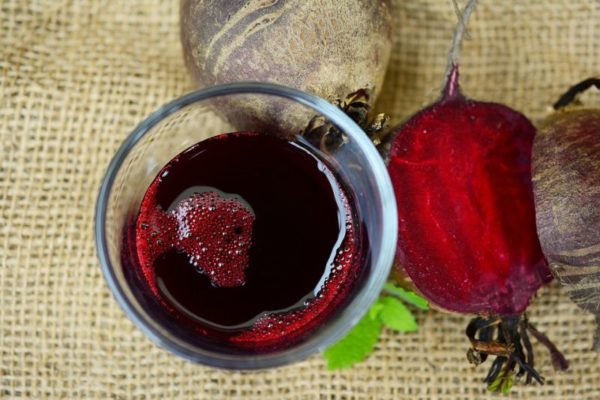
One of the easiest ways of getting more beets to help your liver recover is by turning it into juice.
There are various recipes of beetroot juices combined with other vegetables and/or fruits – you can basically combine it with anything and you won’t go wrong.
My favorite juices are beetroot with apple and carrots or beetroot with orange. They are delicious and pack a nice punch in terms of vitamins and minerals that are beneficial for your liver.
Even though many swear by juicing and say that consuming these juices alone is enough to get all the benefits of beets, that’s not really true.
Although they are definitely better than not consuming beets at all, these juices lack one major element that makes beetroots so healthy: the dietary fiber which is in the pulp.
This does not mean that you shouldn’t drink the juices, especially if you like them. Ideally, you should keep the beets pulp as well and consume it to get all the fiber.
Alternately, you can just eat the pulp alone before or after drinking the juice. Of course, you can just drink the juice as you like it, even if that means that you skip on the pulp as you’re still getting some of the benefits.
Or make smoothies using beetroot – this way, no bits of it are not used, thus gaining all the benefits it has to offer!
Raw Beetroot
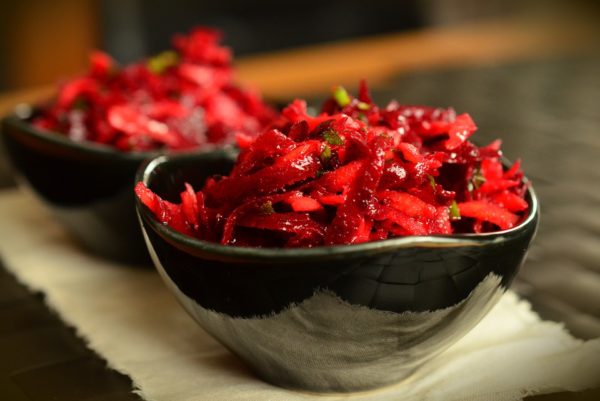
I’ll admit that I am not the biggest fan of the texture and taste of raw beetroot and I prefer it cooked, but the truth is that you lose minimal (if any) nutrients from the beets if you eat them raw. This is why I do my best to eat as much raw beetroot as possible.
I usually eat it as a salad, which is extremely easy to make: simply wash the beets and peel them, then grate them in a bowl (one beet should be just enough for one meal, for a person).
Add a bit of garlic, extra virgin olive oil and a bit of apple cider vinegar, then salt to taste and eat it fresh. It’s delicious just like that and, as you can see, very easy to prepare!
It goes well as a side for all sorts of foods or you can eat it as a snack.
By using these ingredients in the salad, you’re not only getting the beetroot itself and its benefits, but also all the benefits from garlic and ACV which are considered helpful for reversing a fatty liver.
Cooked Beetroot
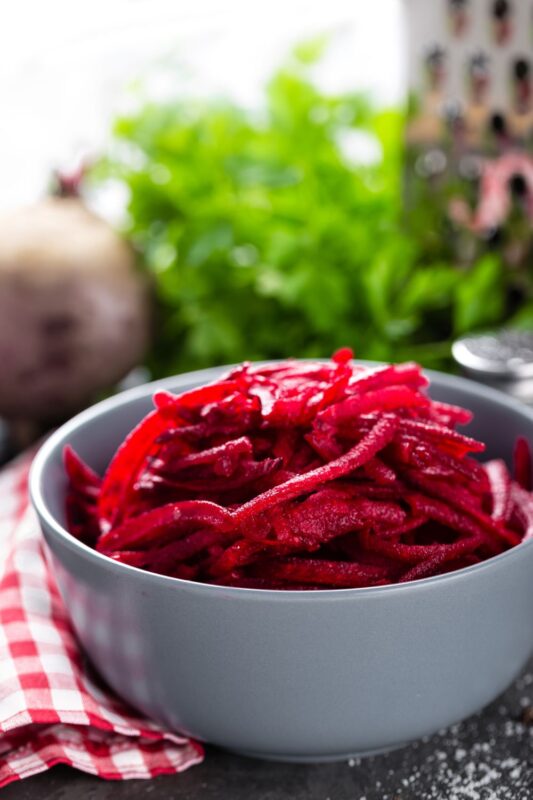
There are various ways to eat cooked beetroot and you can find plenty of recipes online.
Just make sure to only look for those that are safe for fatty liver (no fried stuff, no added sugar or other sweet stuff).
You can boil or bake the beets when cooking them and I personally prefer them boiled, then turned into the salad I talked about above.
One of the biggest disadvantages when cooking the beets is that they lose some of the nutrients (the more you cook them, the more you lose), but in most cases you’re still getting a nice cocktail of vitamins, minerals and healthy dietary fibers.
Are pickled beets good for fatty liver disease?
Yes, pickled beets are good for the liver as they retain the nutrients that give beetroot its antioxidant and anti-inflammatory properties.
Just make sure that there is no sugar added in the process of pickling them, as sugar is something we shouldn’t have.
Conclusion
There are many ways to incorporate beetroot in your fatty liver diet, and you should do so for its healing benefits over the liver. Try to eat at least a few times per week.
The good thing about this food is that it has a pleasant taste and a nice texture and with so many options to incorporate it into your diet, you shouldn’t have problems eating more of it.
Going for eating beets raw is your goal here since you get the most out of it this way, but you can easily alternate with cooked beets and juices or especially smoothies containing them.

I was diagnosed with a fatty liver back in 2014 and managed to reverse it by mid-2015. Since then, I’ve been studying it, continuously updating my knowledge with the latest scientific findings and practical approaches to give others the help they need to reverse their condition.
My approach to managing fatty liver is holistic, balancing scientifically-backed information with real-life, practical advice based on personal, direct experience.
I am also the admin of the Fatty Liver Support Group on Facebook and the Fatty Liver Subreddit.


Are canned beets an alternative when fresh beets are not available?
Yes, they are an alternative – but attention for them not to have any added sugar, as most do.
Are pickled beets good?
Fresh are better in my opinion, but pickled beets are good as well as long as there’s no added sugar.
Beetroot is good primarily for the BETAINE Hcl content… the other vitamin/mineral content is nice, but not important… I suggest getting a Betaine Hcl supplement… much stronger and much more effective than eating a lot of beets… add in some Choline and NAC and eliminate as much sugars as possible.